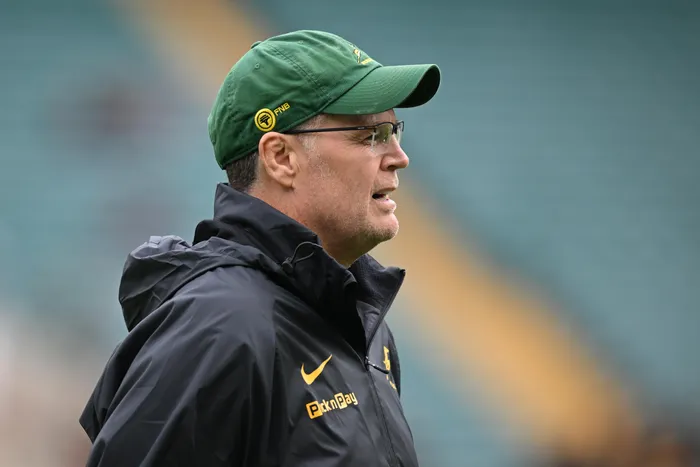Erasmus explains Wembley clash designed to give Japan-based Bok stars valuable game time
Rugby Internationals

Rassie Erasmus has included seven Japan-based players in his starting XV for Saturday's clash against Japan at Wembley.
Image: BackpagePix
Springbok head coach Rassie Erasmus has revealed that Saturday’s Test match against Japan at Wembley Stadium was specifically arranged to give South Africa’s Japan-based players crucial game time ahead of the big matches on their November tour.
Speaking at a media conference yesterday when he named his team, Erasmus said the extra fixture had been planned well in advance to address a long-standing challenge faced by players plying their trade in the Japanese league.
“We actually organised this extra game against Japan especially for the guys who play in the Japanese league because they would not have played a lot of rugby if they didn’t play a lot of Test matches for us,” Erasmus said. “I think there are about 11 or 12 guys – including Manie (Libbok) – who play in the Japanese league.
“The plan was always to get these guys together because we’ve found in the past that when we went on the end-of-year tour previously, when we played Ireland and France and teams like that, we had a bit of a slow start because some of our players were based in Japan and hadn’t really played a lot of rugby. And that’s why this fixture is here.”
Seven members of the starting XV ply their trade in Japan, including the experienced centre pairing of Damian de Allende and Jesse Kriel.
Erasmus said that Pieter-Steph du Toit was the only regular starter among the Japan-based Springboks not selected for the match in London, while Faf de Klerk was deliberately left out to gain match fitness with his Japanese club.
“Because we pick players from all over the world, we totally understand the logistics around the different protocols and the different competitions, and when we start planning our season we know that already – like the fact that the Welsh Test match at the end of the year will also be a bit of a challenge because there are URC fixtures on for some of our franchises that weekend,” Erasmus said.
Despite the logistical juggling act, Erasmus said he was satisfied with the balance and strength of the squad selected to face Japan, noting that the focus now shifts to performance.
“We’re fairly happy that this is what we wanted to achieve. Now the job is to go and win the match,” he added. “On the other hand, it’s also a positive that we can still put a pretty strong team out there.”
The fixture will also evoke memories of Japan’s famous 34-32 victory over the Springboks at the 2015 Rugby World Cup — one of the sport’s most iconic upsets. Erasmus, who watched that match from his bar at home, acknowledged its historical importance but said the current Bok team is focused solely on the present challenge.
“That will always be one of their iconic wins, just like when we first lost to Italy or Wales,” he reflected. “We’ve all been part of history-making things. Australia beat us for the first time in a long time at Ellis Park, and that wasn’t a nice feeling, but you can’t dwell on the past.
“And I guess for Japan that will always be one of their greatest moments, and obviously that will motivate them, but I don’t think we are, at this stage, when we’re planning a game, analysing Japan and how well they played last weekend, or how they are building under Eddie (Jones) and what they’re trying to do.
“For us, it’s about preparing properly and finding ways to win the next match. But none of us can run away from how well they did.”
The last time the teams crossed paths was in the 2019 World Cup quarter-final in Tokyo, where the Boks registered a 26-3 victory before going on to be crowned world champions for the third time in their history.
Related Topics: